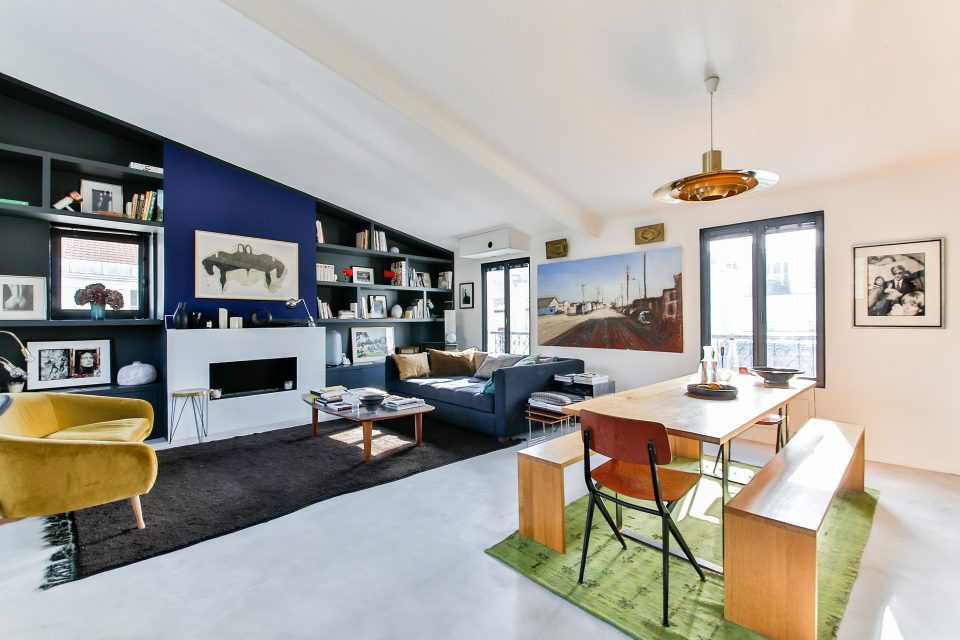
Ways to Maximise Space in Smaller Homes

*Collaborative Post
If you live in a small house or apartment, maximising the space you have is absolutely essential. The way you use your space can be the difference between your home feeling cramped or feeling cosy, so it’s important to put a little thought into your interior design choices. Decorating a small home in the same way you would a larger home is likely to exaggerate its small size, so don’t be afraid to look for new ideas on how to make your home look and feel bigger. Luckily there are plenty of tricks you can use to maximise space and banish that cramped feeling for good.
Multi-Purpose Furniture
When furnishing a smaller home, buying all of the furniture that you usually would is likely to result in blocked pathways and not enough space to relax in. Choosing furniture that can function in a variety of ways is a clever way to be economical with space, for example, a dining table that can also be a desk or chairs that have inbuilt storage space. Such multi-purpose furniture will allow your home to be functional while also saving on valuable space.
Create Zones
Using paint or furniture to create small zones with each room is a great way to make use of your space. Although it requires some planning, the result can be completely unique and impressively creative. One way to create flexible zones in your home is by using internal bi-folding doors, which can be moved to either open or break up space whenever you need them to. For a more subtle approach, you can use a sofa or table to separate one area of a room from another.
Less is More
It goes without saying that you need to have fewer furnishings in a smaller space, but it might be interesting to see just how far you can take this. Having at least one room that only has a few pieces of furniture and no clutter at all can create a place of respite and spaciousness. Employing this idea in a bedroom can make it very relaxing, and when you have fewer furnishings you also have room to make them bigger. Although it might seem counterintuitive, bigger furnishings in a sparse room can give the impression of space as well as style.
Embrace Texture
If your space is too small to carry off bold colours, incorporating different textures instead can make it feel interesting and relaxing. Keeping the colour palette neutral and enhancing it with different textures in furnishings, decor and wall hangings will make even a small space feel fresh, bright and breezy. It’s still possible to enjoy colourful highlights, of course, but this is a great option for those who like to add creative details to their interiors.
Go Vertical
Rather than worrying about how much floor space you have, take advantage of your wall space and use bookshelves, cabinets and other fixtures that reach all the way up to the ceiling. This can create the illusion of more space and also work as a clever storage solution. You might need to grab a ladder occasionally to reach up to those top shelves, but once you see the difference that this trick can make it will absolutely be worth it. You can also apply this idea to wall decorations, as placing framed pictures vertically rather than horizontally can make a room feel taller while also adding interest.

Blank Space
Don’t give in to the urge to fill every bit of space you have, as often it’s the empty space that makes a room feel bigger. A great way to do this is to group objects, rather than spreading them out and highlight the space in between them. This may mean getting rid of some of your ornaments or clearing away clutter, but once you see the difference it makes to your space you’ll never go back.
Making a smaller house or apartment feel bigger might seem like a challenge, but by taking on some of these tips you can absolutely transform a cramped space into a stylish and spacious area. While it might take some planning and a bit of a rethink when it comes to how you decorate, once you’ve maximised the space in one room you’ll want to apply this to your entire home.

*This is a collaborative post. For further information please refer to my disclosure page.
Pin for later:





